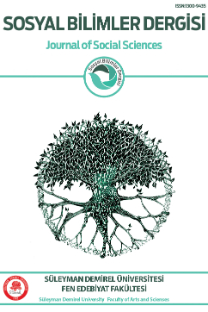William Beckford's Depiction of the Orientand the Oriental as Infernal in Vathek
William Beckford'un VathekAdlı EserindeDoğu ve Doğuluyu Şeytanlaştırmas
___
AL-ALWAN, Muna, 'The Orient Made Oriental: A Study of William Beckford's Vathek', Arab Studies Quarterly, Vol. XXX, No. 4, 2008, p. 43-52.BARFOOT, Cedric C., 'English Romantic Poets and the "Free-Floating Orient"', Oriental Prospects: Western Literature and the Lure of the Orient, Amsterdam: Rodopi, 1998, p. 65-96.
BECKFORD, William, Vathek. Oxford U.P., Oxford, 1983.
BIBLE, King James Version.
BOTTING, Fred, Gothic, Routledge, London, 1996.
BROCKMAN, H.A.N., The Caliph of Fonthill, Werner Laurie, London, 1956.
CHAURASIA, Radney Shyam, History of Middle East, Atlantic Publishers, New Delhi, 2005.
DURING, Simon, 'Beckford in Hell: An Episode in the History of Secular Enchantment,' Huntington Library Quarterly, Vol. LXX, No. 2, 2007, p. 269-288.
GANCHY, Sally, Islam and Science, Medicine, and Technology, The Rosen Publishing Group, New York, 2009.
HENNESSY, Brendan, The Gothic Novel, Longman, Harlow Essex, 1978.
JUNG, Carl G., The Archetypes and the Collective Unconscious, Princeton U.P., Princeton, 1990.
KEYMER, Thomas, Introduction to Vathek by William Beckford, Oxford U.P., Oxford, 2013.
LEWIS, Bernard, Islam and the West, Oxford U.P., Oxford, 1993.
LONSDALE, Roger, Introduction to Vathek by William Beckford, Oxford U.P., Oxford, 1983.
MARZOLP, Ulrich-LEEUWEN, Richard, The Arabian Nights Encyclopedia, Vol. I, ABC-CLIO, Santa Barbara, 2005.
MURSELL, Gordon, English Spirituality: From 1700 to the Present Day, Westminster John Knox Press, London, 2001.
SAID, Edward, Culture and Imperialism, Vintage Books, New York, 1993.
SAID, Edward, Orientalism, Penguin, London, 2003.
SERGHINI, E. H. B., 'William Beckford's Symbolic Appropriation of the Oriental Context'. Oriental Prospects: Western Literature and the Lure of the East, Eds. C. C. Barfoot-Theo d'Haen, Amsterdam: Rodopi, 1998, p. 43-64.
SVILPIS, Janis E., 'Orientalism, Fantasy, and Vathek' Vathek and the Escape from Time: Bicentenary Revoluations, Ed. Kenneth W. Graham, AMS Press, New York, 1990.
WATT, Ian, The Rise of the Novel, University of California Press, Berkeley and Los Angeles, 2001.
- ISSN: 1300-9435
- Yayın Aralığı: 3
- Başlangıç: 1995
- Yayıncı: Süleyman Demirel Üniversitesi, Fen-Edebiyat Fakültesi
Kral I. Prusias'ın Yayılmacı Politikası
William Beckford's Depiction of the Orientand the Oriental as Infernal in Vathek
Aleksandria Troas Antik Kenti HS Sektörü'nde Ele Geçen Volütlü Kandiller
Osmanlı Devleti'nde Kanunnamelerden Nizamnamelere Geçiş
Birgi Karaoğlu Camii'nin Vaaz Kürsüsü
Milli Parkların Turizm ve Rekreasyonel Faaliyetlerde Sürdürülebilir Kullanımı: Isparta İli Örneği
İSMAİL KERVANKIRAN, ADİLE GÜL ERYILMAZ
Salah Birsel'in Şiirlerinde Toplumsal Eleştiri Söylemi Olarak Yergi ve İroni
